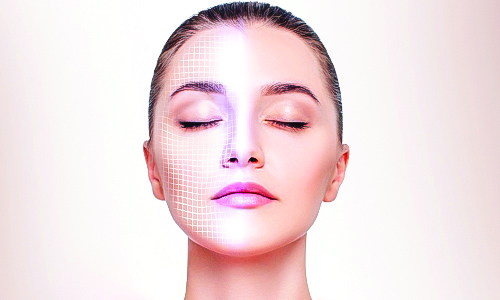In today’s rapidly evolving beauty industry, the intersection of art, creativity, and technology has become more prominent than ever before. Artificial Intelligence has stepped in as a transformative force in many sectors and has made its mark in the field of beauty as well. Today’s generation knows everything from personalized skin care solutions to virtual makeup try-ons, all thanks to AI that is revolutionizing the way consumers engage with cosmetics. With access to vast amounts of ones data and insights, AI tools can help identify trends, optimize formulas, and even suggest entirely new products tailored to customer needs.
Technology has revolutionized every aspect of the beauty industry, from product development and marketing to customer experience and service delivery. Advancements such as 3D printing, artificial intelligence, virtual reality, and augmented reality have opened up new possibilities for beauty professionals and consumers alike.
Global Artificial Intelligence in the beauty industry is continuously growing at an expected compound growth rate of 20 percent annually. Perhaps, this is why there has been a positive impact on the revenue of the industry. The beauty and cosmetics market size is already estimated to grow to $663 billion in 2027.
While we talk about AI being a game changer for the beauty industry, we must remember that the profession now also demands knowledge of technology to be blended with art and creativity. In this rapidly evolving landscape, continuous education and adaptability are paramount for beauty professionals.
As technology continues to reshape traditional beauty practices, staying informed and up-to-date on the latest advancements is paramount for beauty professionals looking to thrive in the digital age. The importance of education and adaptability in the beauty industry cannot be overstated. In a rapidly changing landscape where technology plays an increasingly prominent role, staying informed, flexible, and open to new ideas is key to success. From mastering digital marketing strategies to understanding AI-driven product development, these courses provide professionals with the tools they need to excel in their careers.
Students Should Explore Emerging Trends
From 3D printing and biotechnology to augmented reality and virtual reality, there are countless opportunities for innovation in the beauty industry. Students should familiarize themselves with the principles of design thinking and consumer-centric innovation. For students seeking to learn about product innovation in the beauty industry, it is crucial to understand the role that AI plays in this process. By understanding the needs and desires of consumers, beauty professionals can develop products that resonate with their target audience and address unmet needs in the market.
AI made Skin Analysis Easier
The advent of AI in the beauty industry is a game changer. It provides unprecedented insights and capabilities. Through its algorithm, an effective result can be given by understanding the preferences of the consumer. This personalized approach enhances the customer experience, which increases satisfaction. Through AI-powered skin care apps, the user gets personalized skin analysis and diagnosis. By analyzing the skin, these tools identify skin-related issues and then recommend skin care routines and products to the user accordingly. These devices are also easy to use and the user gets accurate advice for his problems while sitting at home. This approach enables consumers to take control of their beauty routine. By trying this they can even get good results.
Similarly, in some tools you have to enter some issues related to your hair and along with diagnosing your problem, you get advice related to hair type and concern.
Virtual Try-On Experiences
Gone are the times when you had to physically go from one store to another to test makeup or buy beauty products. This has also become easier for us through technology. AI’s virtual try-on technology today gives users the opportunity to experiment with different looks. You don’t need to go anywhere. You can try many makeup looks and hairstyles while sitting at home. You can choose them from the comfort of your home. Now you can visualize the effects of cosmetics on yourself through facial recognition in real time. This not only enhances the online shopping experience but also reduces the risk of dissatisfaction with products.
Improving Product Formulations
AI enables brands to continuously refine and improve their product formulations over time. As new data becomes available and consumer preferences evolve, AI algorithms can analyze this information and suggest adjustments to product formulations to ensure relevance and efficacy. One of the key advantages of using AI in personalized product development is its ability to analyze skin type and the effectiveness of ingredients. With AI, students can learn how to analyze vast amounts of consumer data to identify trends, preferences, and patterns. This understanding allows beauty brands to create products that resonate with their target audience on a deeper level.
Despite all these technological advancements, one thing remains unchanged- the importance of creativity and human touch in the beauty industry. While technology can enhance efficiency and effectiveness, it is ultimately the artistic vision and emotional connection that truly resonates with people.

